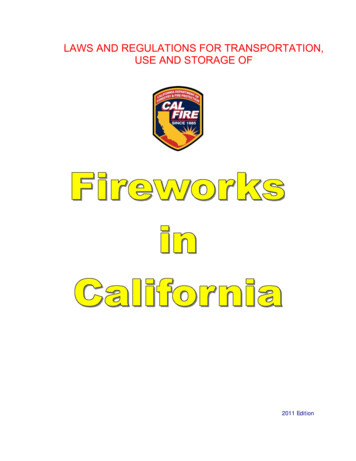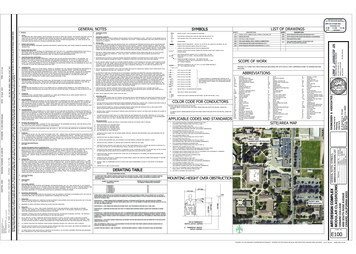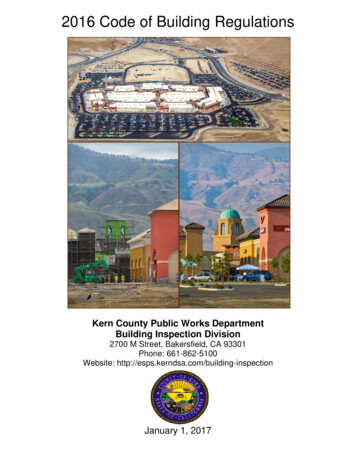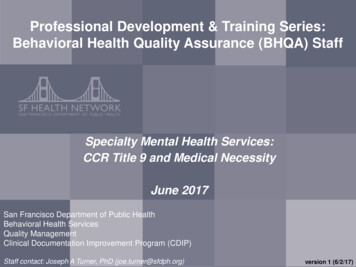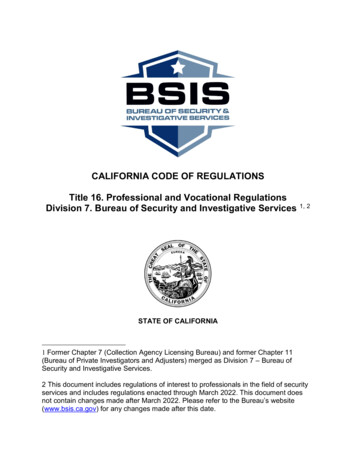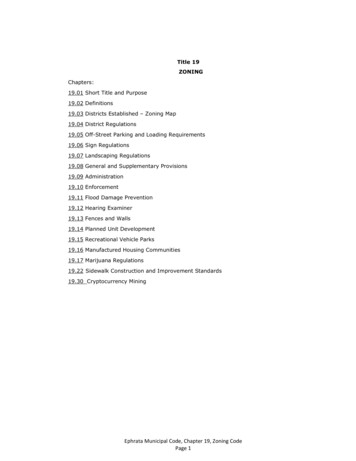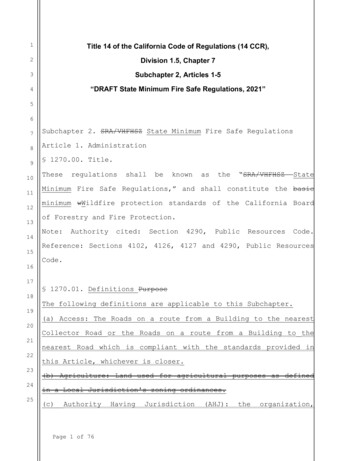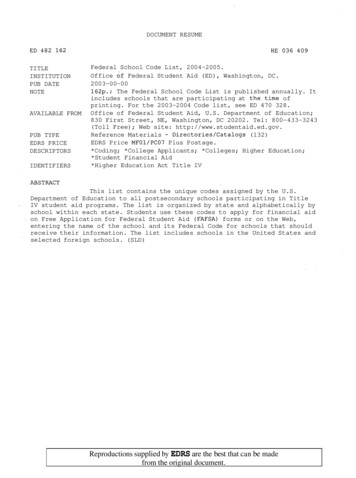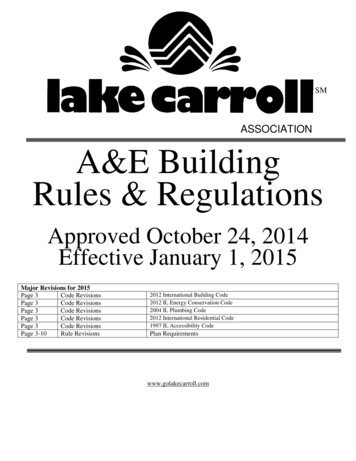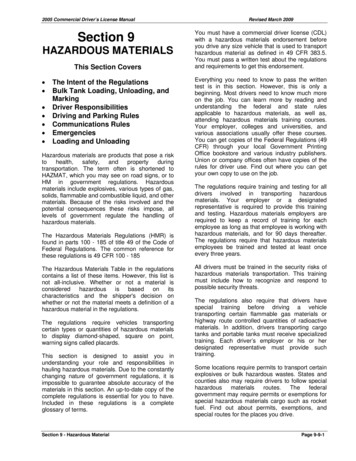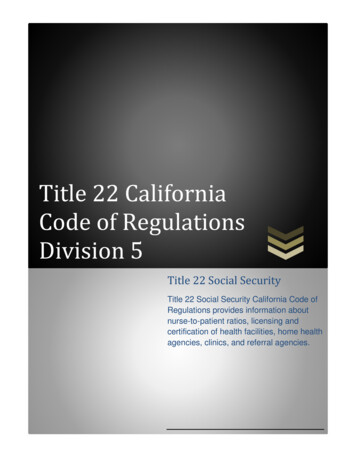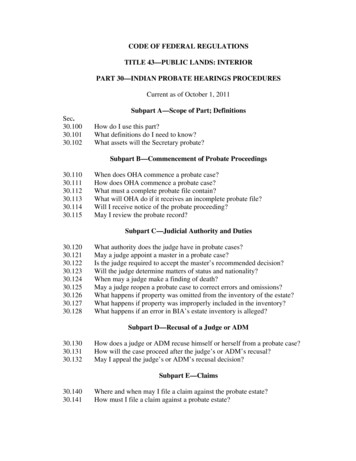
Transcription
CODE OF FEDERAL REGULATIONSTITLE 43—PUBLIC LANDS: INTERIORPART 30—INDIAN PROBATE HEARINGS PROCEDURESCurrent as of October 1, 2011Subpart A—Scope of Part; DefinitionsSec.30.10030.10130.102How do I use this part?What definitions do I need to know?What assets will the Secretary probate?Subpart B—Commencement of Probate n does OHA commence a probate case?How does OHA commence a probate case?What must a complete probate file contain?What will OHA do if it receives an incomplete probate file?Will I receive notice of the probate proceeding?May I review the probate record?Subpart C—Judicial Authority and .12730.128What authority does the judge have in probate cases?May a judge appoint a master in a probate case?Is the judge required to accept the master’s recommended decision?Will the judge determine matters of status and nationality?When may a judge make a finding of death?May a judge reopen a probate case to correct errors and omissions?What happens if property was omitted from the inventory of the estate?What happens if property was improperly included in the inventory?What happens if an error in BIA’s estate inventory is alleged?Subpart D—Recusal of a Judge or ADM30.13030.13130.132How does a judge or ADM recuse himself or herself from a probate case?How will the case proceed after the judge’s or ADM’s recusal?May I appeal the judge’s or ADM’s recusal decision?Subpart E—Claims30.14030.141Where and when may I file a claim against the probate estate?How must I file a claim against a probate estate?
30.14230.14330.14430.14530.14630.14730.148Will a judge authorize payment of a claim from the estate if the decedent’snon-trust estate was or is available?Are there any categories of claims that will not be allowed?May the judge authorize payment of the costs of administering the estate?When can a judge reduce or disallow a claim?What property is subject to claims?What happens if there is not enough trust personalty to pay all the claims?Will interest or penalties charged after the date of death be paid?Subpart F—Consolidation and Settlement Agreements30.15030.15130.15230.153What action will the judge take if the interested parties agree to settle mattersamong themselves?May the devisees or eligible heirs in a probate proceeding consolidate theirinterests?May the parties to an agreement waive valuation of trust property?Is an order approving an agreement considered a partition or sale transaction?Subpart G—Purchase at 175What may be purchased at probate?Who may purchase at probate?Does property purchased at probate remain in trust or restricted status?Is consent required for a purchase at probate?What must I do to purchase at probate?Whom will OHA notify of a request to purchase at probate?What will the notice of the request to purchase at probate include?How does OHA decide whether to approve a purchase at probate?How will the judge allocate the proceeds from a sale?What may I do if I do not agree with the appraised market value?What may I do if I disagree with the judge’s determination to approve apurchase at probate?What happens when the judge grants a request to purchase at probate?When must the successful bidder pay for the interest purchased?What happens after the successful bidder submits payment?What happens if the successful bidder does not pay within 30 days?When does a purchased interest vest in the purchaser?Subpart H—Renunciation of Interest30.18030.18130.18230.183May I give up an inherited interest in trust or restricted property or trustpersonalty?How do I renounce an inherited interest?Who may receive a renounced interest in trust or restricted land?Who may receive a renounced interest of less than 5 percent in trust orrestricted land?2
30.18430.18530.18630.18730.188Who may receive a renounced interest in trust personalty?May my designated recipient refuse to accept the interest?Are renunciations that predate the American Indian Probate Reform Act of2004 valid?May I revoke my renunciation?Does a renounced interest vest in the person who renounced it?Subpart I—Summary Probate 20630.207What is a summary probate proceeding?What does a notice of a summary probate proceeding contain?May I file a claim or renounce or disclaim an interest in the estate in asummary probate proceeding?May I request that a formal probate proceeding be conducted instead of asummary probate proceeding?What must a summary probate decision contain?How do I seek review of a summary probate proceeding?What happens after I file a request for de novo review?What happens if nobody files for de novo review?Subpart J—Formal Probate ProceedingsNOTICE30.21030.21130.21230.21330.214How will I receive notice of the formal probate proceeding?Will the notice be published in a newspaper?May I waive notice of the hearing or the form of notice?What notice to a tribe is required in a formal probate proceeding?What must a notice of hearing contain?DEPOSITIONS, DISCOVERY, AND PREHEARING 2130.22230.223How may I obtain documents related to the probate proceeding?How do I obtain permission to take depositions?How is a deposition taken?How may the transcript of a deposition be used?Who pays for the costs of taking a deposition?How do I obtain written interrogatories and admission of facts anddocuments?May the judge limit the time, place, and scope of discovery?What happens if a party fails to comply with discovery?What is a prehearing conference?HEARINGS30.224May a judge compel a witness to appear and testify at a hearing or deposition?3
.23330.234Must testimony in a probate proceeding be under oath or affirmation?Is a record made of formal probate hearings?What evidence is admissible at a probate hearing?Is testimony required for self-proved wills, codicils, or revocations?When will testimony be required for approval of a will, codicil, or revocation?Who pays witnesses’ costs?May a judge schedule a supplemental hearing?What will the official record of the probate case contain?What will the judge do with the original record?What happens if a hearing transcript has not been prepared?DECISIONS IN FORMAL 24130.24230.24330.24430.24530.246What will the judge’s decision in a formal probate proceeding contain?How are covered permanent improvements treated?What notice of the decision will the judge provide?May I file a petition for rehearing if I disagree with the judge’s decision in theformal probate hearing?Does any distribution of the estate occur while a petition for rehearing ispending?How will the judge decide a petition for rehearing?May I submit another petition for rehearing?When does the judge’s decision on a petition for rehearing become final?May a closed probate case be reopened?How will the judge decide my petition for reopening?What happens if the judge reopens the case?When will the decision on reopening become final?Subpart K—Miscellaneous Provisions30.25030.25130.25230.25330.254When does the anti-lapse provision apply?What happens if an heir or devisee participates in the killing of the decedent?May a judge allow fees for attorneys representing interested parties?How must minors or other legal incompetents be represented?What happens when a person dies without a valid will and has no heirs?Subpart L—Tribal Purchase of Interests under Special Statutes30.26030.26130.26230.26330.26430.265What land is subject to a tribal purchase option at probate?How does a tribe exercise its statutory option to purchase?When may a tribe exercise its statutory option to purchase?May a surviving spouse reserve a life estate when a tribe exercises itsstatutory option to purchase?When must BIA furnish a valuation of a decedent’s interests?What determinations will a judge make with respect to a tribal purchaseoption?4
.274When is a final decision issued?What if I disagree with the probate decision regarding tribal purchase option?May I demand a hearing regarding the tribal purchase option decision?What notice of the hearing will the judge provide?How will the hearing be conducted?How must the tribe pay for the interests it purchases?What are BIA’s duties on payment by the tribe?What action will the judge take to record title?What happens to income from land interests during pendency of the probate?AUTHORITY: 5 U.S.C. 301, 503; 25 U.S.C. 9, 372-74, 410, 2201 et seq.;43 U.S.C. 1201, 1457.CROSS REFERENCE: For regulations pertaining to the processing of Indian probatematters within the Bureau of Indian Affairs, see 25 CFR part 15. For regulationspertaining to the appeal of decisions of the Probate Hearings Division, Office of Hearingsand Appeals, to the Board of Indian Appeals, Office of Hearings and Appeals, see43 CFR part 4, subpart D. For regulations generally applicable to proceedings before theHearings Divisions and Appeal Boards of the Office of Hearings and Appeals, see43 CFR part 4, subpart B.Subpart A—Scope of Part; Definitions§ 30.100 How do I use this part?(a) The following table is a guide to the relevant contents of this part by subjectmatter.For provisions relating to.(1) All proceedings in part 30 (2) Claims against probate estate .(3) Commencement of probate .(4) Consolidation of interests (5) Formal probate proceedings before anadministrative law judge or Indian probatejudge.(6) Probate of estates of Indians who diepossessed of trust or restricted property.(7) Purchases at probate .(8) Renunciation of interests .(9) Summary probate proceedings beforean attorney decision maker.consult.§§ 30.100 through 30.102.§§ 30.140 through 30.148.§§ 30.110 through 30.115.§§ 30.150 through 30.153.§§ 30.210 through 30.246.All sections except §§ 30.260 through 30.274.§§ 30.160 through 30.175.§§ 30.180 through 30.188.§§ 30.200 through 30.207.5
(10) Tribal purchase of certain propertyinterests of decedents under special lawsapplicable to particular Tribes.§§ 30.260 through 30.274.(b) Except as limited by the provisions of this part, the regulations in part 4,subparts A and B of this subtitle apply to these proceedings.(c) The following provisions do not apply to Alaska property interests:(1) § 30.151;(2) §§ 30.160 through 30.175;(3) § 30.182 through 30.185, except for § 30.184(c);(4) § 30.213; and(5) § 30.214(f) and (g).§ 30.101 What definitions do I need to know?Act means the Indian Land Consolidation Act and its amendments, including theAmerican Indian Probate Reform Act of 2004 (AIPRA), Public Law 108-374, as codifiedat 25 U.S.C. 2201 et seq.Administrative law judge (ALJ) means an administrative law judge with OHAappointed under the Administrative Procedure Act, 5 U.S.C. 3105.Affidavit means a written declaration of facts by a person that is signed by thatperson, swearing or affirming under penalty of perjury that the facts declared are true andcorrect to the best of that person’s knowledge and belief.Agency means:(1) The Bureau of Indian Affairs (BIA) agency office, or any other designatedoffice in BIA, having jurisdiction over trust or restricted land and trust personalty; and(2) Any office of a tribe that has entered into a contract or compact to fulfill theprobate function under 25 U.S.C. 450f or 458cc.Attorney decision maker (ADM) means an attorney with OHA who conducts asummary proceeding and renders a decision that is subject to de novo review by anadministrative law judge or Indian probate judge.BIA means the Bureau of Indian Affairs within the Department.BLM means the Bureau of Land Management within the Department.Board means the Interior Board of Indian Appeals within OHA.Chief ALJ means the Chief Administrative Law Judge, Probate Hearings Division,OHA.Child means a natural or adopted child.Codicil means a supplement or addition to a will, executed with the sameformalities as a will. It may explain, modify, add to, or revoke provisions in an existingwill.Consolidation agreement means a written agreement under the provisions of25 U.S.C. 2206(e) or 2206(j)(9), entered during the probate process, approved by thejudge, and implemented by the probate order, by which a decedent’s heirs and deviseesconsolidate interests in trust or restricted land.Covered permanent improvement means a permanent improvement (including aninterest in such an improvement) that is:6
(1) Owned by the decedent at the time of death; and(2) Attached to a parcel of trust or restricted land that is also, in whole or in part,owned by the decedent at the time of death.Creditor means any individual or entity that has a claim for payment from adecedent’s estate.Day means a calendar day.Decedent means a person who is deceased.Decision or order (or decision and order) means:(1) A written document issued by a judge making determinations as to heirs,wills, devisees, and the claims of creditors, and ordering distribution of trust or restrictedland or trust personalty;(2) The decision issued by an ADM in a summary probate proceeding; or(3) A decision issued by a judge finding that the evidence is insufficient todetermine that a person is deceased by reason of unexplained absence.De novo review means a process in which an administrative law judge or Indianprobate judge, without regard to the decision previously issued in the case, will:(1) Review all the relevant facts and issues in a probate case;(2) Reconsider the evidence introduced at a previous hearing;(3) Conduct a formal hearing as necessary or appropriate; and(4) Issue a decision.Department means the Department of the Interior.Deposition means a proceeding in which a party takes testimony from a witnessduring discovery.Devise means a gift of property by will. Also, to give property by will.Devisee means a person or entity that receives property under a will.Discovery means a process through which a party to a probate proceeding obtainsinformation from another party. Examples of discovery include interrogatories,depositions, requests for admission, and requests for production of documents.Eligible heir means, for the purposes of the Act, any of a decedent’s children,grandchildren, great grandchildren, full siblings, half siblings by blood, and parents whoare:(1) Indian;(2) Lineal descendents within two degrees of consanguinity of an Indian; or(3) Owners of a trust or restricted interest in a parcel of land for purposes ofinheriting – by descent, renunciation, or consolidation agreement – another trust orrestricted interest in such a parcel from the decedent.Estate means the trust or restricted land and trust personalty owned by thedecedent at the time of death.Formal probate proceeding means a proceeding, conducted by a judge, in whichevidence is obtained through the testimony of witnesses and the receipt of relevantdocuments.Heir means any individual or entity eligible to receive property from a decedentin an intestate proceeding.Individual Indian Money (IIM) account means an interest bearing account fortrust funds held by the Secretary that belong to a person who has an interest in trustassets. These accounts are under the control and management of the Secretary.7
Indian means, for the purposes of the Act:(1) Any person who is a member of a federally recognized Indian tribe, is eligibleto become a member of any federally recognized Indian tribe, or is an owner (as ofOctober 27, 2004) of a trust or restricted interest in land;(2) Any person meeting the definition of Indian under 25 U.S.C. 479; or(3) With respect to the inheritance and ownership of trust or restricted land in theState of California under 25 U.S.C. 2206, any person described in paragraph (1) or (2) ofthis definition or any person who owns a trust or restricted interest in a parcel of suchland in that State.Indian probate judge (IPJ) means an attorney with OHA, other than an ALJ, towhom the Secretary has delegated the authority to hear and decide Indian probate cases.Interested party means:(1) Any potential or actual heir;(2) Any devisee under a will;(3) Any person or entity asserting a claim against a decedent’s estate;(4) Any tribe having a statutory option to purchase the trust or restricted propertyinterest of a decedent; or(5) Any co-owner exercising a purchase option.Interrogatories means written questions submitted to another party for responsesas part of discovery.Intestate means that the decedent died without a valid will as determined in theprobate proceeding.Judge means an ALJ or IPJ.Lockbox means a centralized system within OST for receiving and depositingtrust fund remittances collected by BIA.LTRO means the Land Titles and Records Office within BIA.Master means a person who has been specially appointed by a judge to assist withthe probate proceedings.Minor means an individual who has not reached the age of majority as defined bythe applicable law.OHA means the Office of Hearings and Appeals within the Department.OST means the Office of the Special Trustee for American Indians within theDepartment.Per stirpes means by right of representation, dividing an estate into equal sharesbased on the number of decedent’s surviving children and predeceased children who leftissue who survive the decedent. The share of a predeceased child of the decedent isdivided equally among the predeceased child’s surviving children.Probate means the legal process by which applicable tribal, Federal, or State lawthat affects the distribution of a decedent’s estate is applied in order to:(1) Determine the heirs;(2) Determine the validity of wills and determine devisees;(3) Determine whether claims against the estate will be paid from trust personalty;and(4) Order the transfer of any trust or restricted land or trust personalty to the heirs,devisees, or other persons or entities entitled by law to receive them.8
Purchase option at probate means the process by which eligible purchasers canpurchase a decedent’s interest during the probate proceeding.Restricted property means real property whose title is held by an Indian but whichcannot be alienated or encumbered without the consent of the Secretary. For thepurposes of probate proceedings, restricted property is treated as if it were trust property.Except as the law may provide otherwise, the term “restricted property” as used in thispart does not include the restricted lands of the Five Civilized Tribes of Oklahoma or theOsage Nation.Secretary means the Secretary of the Interior or an authorized representative.Summary probate proceeding means the consideration of a probate file without ahearing. A summary probate proceeding may be conducted if the estate involves only anIIM account that did not exceed 5,000 in value on the date of the death of the decedent.Superintendent means a BIA Superintendent or other BIA official, including afield representative or one holding equivalent authority.Testate means that the decedent executed a valid will as determined in the probateproceeding.Testator means a person who has executed a valid will as determined in theprobate proceeding.Trust personalty means all tangible personal property, funds, and securities of anykind that are held in trust in an IIM account or otherwise supervised by the Secretary.Trust property means real or personal property, or an interest therein, the title towhich is held in trust by the United States for the benefit of an individual Indian or tribe.We or us means the Secretary or an authorized representative as defined in thissection.Will means a written testamentary document that was executed by the decedentand attested to by two disinterested adult witnesses, and that states who will receive thedecedent’s trust or restricted property.You or I means an interested party, as defined herein, with an interest in thedecedent’s estate unless a specific section states otherwise.§ 30.102 What assets will the Secretary probate?(a) We will probate only the trust or restricted land or trust personalty owned bythe decedent at the time of death.(b) We will not probate the following property:(1) Real or personal property other than trust or restricted land or trust personaltyowned by the decedent at the time of death;(2) Restricted land derived from allotments made to members of the FiveCivilized Tribes (Cherokee, Choctaw, Chickasaw, Creek, and Seminole) in Oklahoma;and(3) Restricted interests derived from allotments made to Osage Indians inOklahoma (Osage Nation) and Osage headright interests owned by Osage decedents.(c) We will probate that part of the lands and assets owned by a deceased memberof the Five Civilized Tribes or Osage Nation who owned either a trust interest in land or arestricted interest in land derived from an individual Indian who was a member of a Tribeother than the Five Civilized Tribes or the Osage Nation.9
Subpart B—Commencement of Probate Proceedings§ 30.110 When does OHA commence a probate case?OHA commences probate of an estate when OHA receives a probate file from theagency.§ 30.111 How does OHA commence a probate case?OHA commences a probate case by confirming the case number assigned by BIA,assigning the case to a judge or ADM, and designating the case as a summary probateproceeding or formal probate proceeding.§30.112 What must a complete probate file contain?A probate file must contain the documents and information described in 25 CFR15.202 and any other relevant information.§ 30.113 What will OHA do if it receives an incomplete probate file?If OHA determines that the probate file received from the agency is incomplete orlacks the certification described in 25 CFR 15.204, OHA may do any of the following:(a) Request the missing information from the agency;(b) Dismiss the case and return the probate file to the agency for furtherprocessing;(c) Issue a subpoena, interrogatories, or requests for production of documents asappropriate to obtain the missing information; or(d) Proceed with a hearing in the case.§ 30.114 Will I receive notice of the probate proceeding?(a) If the case is designated as a formal probate proceeding, OHA will send anotice of hearing to:(1) Potential heirs and devisees named in the probate file;(2) Those creditors whose claims are included in the probate file; and(3) Other interested parties identified by OHA.(b) In a case designated a summary probate proceeding, OHA will send a noticeof the designation to potential heirs and devisees and will inform them that a formalprobate proceeding may be requested instead of the summary probate proceeding.§ 30.115 May I review the probate record?After OHA receives the case, you may examine the probate record at the relevantoffice during regular business hours and make copies at your own expense. Access to10
records in the probate file is governed by 25 U.S.C. 2216(e), the Privacy Act, and theFreedom of Information Act.Subpart C—Judicial Authority and Duties§ 30.120 What authority does the judge have in probate cases?A judge who is assigned a probate case under this part has the authority to:(a) Determine the manner, location, and time of any hearing conducted under thispart, and otherwise to administer the cases;(b) Determine whether an individual is deemed deceased by reason of extendedunexplained absence or other pertinent circumstances;(c) Determine the heirs of any Indian or eligible heir who dies intestate possessedof trust or restricted property;(d) Approve or disapprove a will disposing of trust or restricted property;(e) Accept or reject any full or partial renunciation of interest in either a testate orintestate proceeding;(f) Approve or disapprove any consolidation agreement;(g) Conduct sales at probate and provide for the distribution of interests in theprobate decision and order;(h) Allow or disallow claims by creditors;(i) Order the distribution of trust property to heirs and devisees and determine andreserve the share to which any potential heir or devisee who is missing but not found tobe deceased is entitled;(j) Determine whether a tribe has jurisdiction over the trust or restricted propertyand, if so, the right of the tribe to receive a decedent’s trust or restricted property under25 U.S.C. 2206(a)(2)(B)(v), 2206(a)(2)(D)(iii)(IV), or other applicable law;(k) Issue subpoenas for the appearance of persons, the testimony of witnesses, andthe production of documents at hearings or depositions under 25 U.S.C. 374, on thejudge’s initiative or, within the judge’s discretion, on the request of an interested party;(l) Administer oaths and affirmations;(m) Order the taking of depositions and determine the scope and use of depositiontestimony;(n) Order the production of documents and determine the scope and use of thedocuments;(o) Rule on matters involving interrogatories and any other requests for discovery,including requests for admissions;(p) Grant or deny stays, waivers, and extensions;(q) Rule on motions, requests, and objections;(r) Rule on the admissibility of evidence;(s) Permit the cross-examination of witnesses;(t) Appoint a guardian ad litem for any interested party who is a minor or foundby the judge not to be competent to represent his or her own interests;(u) Regulate the course of any hearing and the conduct of witnesses, interestedparties, attorneys, and attendees at a hearing;(v) Determine and impose sanctions and penalties allowed by law; and11
(w) Take any action necessary to preserve the trust assets of an estate.§ 30.121 May a judge appoint a master in a probate case?(a) In the exercise of any authority under this part, a judge may appoint a masterto do all of the following:(1) Conduct hearings on the record as to all or specific issues in probate cases asassigned by the judge;(2) Make written reports including findings of fact and conclusions of law; and(3) Propose a recommended decision to the judge.(b) When the master files a report under this section, the master must also mail acopy of the report and recommended decision to all interested parties.§ 30.122 Is the judge required to accept the master’s recommended decision?No, the judge is not required to accept the master’s recommended decision.(a) An interested party may file objections to the report and recommendeddecision within 30 days of the date of mailing. An objecting party must simultaneouslymail or deliver copies of the objections to all other interested parties.(b) Any other interested party may file responses to the objections within 15 daysof the mailing or delivery of the objections. A responding party must simultaneouslymail or deliver a copy of his or her responses to the objecting party.(c) The judge will review the record of the proceedings heard by the master,including any objections and responses filed, and determine whether the master’s reportand recommended decision are supported by the evidence of record.(1) If the judge finds that the report and recommended decision are supported bythe evidence of record and are consistent with applicable law, the judge will enter anorder adopting the recommended decision.(2) If the judge finds that the report and recommended decision are not supportedby the evidence of record, the judge may do any of the following:(i) Remand the case to the master for further proceedings consistent withinstructions in the remand order;(ii) Make new findings of fact based on the evidence in the record, makeconclusions of law, and enter a decision; or(iii) Hear the case de novo, make findings of fact and conclusions of law, andenter a decision.(3) The judge may find that the master’s findings of fact are supported by theevidence in the record but the conclusions of law or the recommended decision is notconsistent with applicable law. In this case, the judge will issue an order adopting thefindings of fact, making conclusions of law, and entering a decision.§ 30.123 Will the judge determine matters of status and nationality?(a) The judge in a probate proceeding will determine:(1) The status of eligible heirs or devisees as Indians;(2) If relevant, the nationality or citizenship of eligible heirs or devisees; and12
(3) Whether any of the Indian heirs or devisees with U.S. citizenship areindividuals for whom the supervision and trusteeship of the United States has beenterminated.(b) A judge may make determinations under this section in a current probateproceeding or in a completed probate case after a reopening without regard to a timelimit.§ 30.124 When may a judge make a finding of death?(a) A judge may make a finding that an heir, devisee, or person for whom aprobate case has been opened is deceased, by reason of extended unexplained absence orother pertinent circumstances. The judge must include the date of death in the finding.The judge will make a finding of death only on:(1) A determination from a court of competent jurisdiction; or(2) Clear and convincing evidence.(b) In any proceeding to determine whether a person is deceased, the followingrebuttable presumptions apply:(1) The absent person is presumed to be alive if credible evidence establishes thatthe absent person has had contact with any person or entity during the 6-year periodpreceding the hearing; and(2) The absent person is presumed to be deceased if clear and convincingevidence establishes that no person or entity with whom the absent person previously hadregular contact has had any contact with the absent person during the 6 years precedingthe hearing.§ 30.125 May a judge reopen a probate case to correct errors and omissions?(a) On the written request of an interested party, or on the basis of the judge’sown order, at any time, a judge has the authority to reopen a probate case to:(1) Determine the correct identity of the original allottee, or any heir or devisee;(2) Determine whether different persons
Subpart L—Tribal Purchase of Interests under Special Statutes . 30.260 What land is subject to a tribal purchase option at probate? 30.261 How does a tribe exercise its statutory option to purchase? 30.262 When may a tribe exercise its statutory option to purchase? 30.263 May a surviving spouse reserve a life estate when a tribe exercises its
